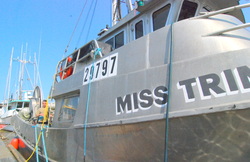 Steveston Village, BC--The CFV Miss Trimar, a 42-foot salmon seiner skippered by Brian O'Brien, goes out for a couple of days at a time to fish the estuaries. She's a tall, sturdy, steel-hulled boat rigged with all the electronics of modern fishing. During last year's "100-year-event" (an enormous run of sockeye on the Fraser) she was one of only 20 commercial boats on a 300-mile stretch of water. Normally, the Miss Trimar can carry 12,000 "pieces" in her hold, 30 tons of fish at a time, but O'Brien's quarter-mile sets were netting as many as 50,000 sockeye at a time. It was overwhelming.
Steveston Village, BC--The CFV Miss Trimar, a 42-foot salmon seiner skippered by Brian O'Brien, goes out for a couple of days at a time to fish the estuaries. She's a tall, sturdy, steel-hulled boat rigged with all the electronics of modern fishing. During last year's "100-year-event" (an enormous run of sockeye on the Fraser) she was one of only 20 commercial boats on a 300-mile stretch of water. Normally, the Miss Trimar can carry 12,000 "pieces" in her hold, 30 tons of fish at a time, but O'Brien's quarter-mile sets were netting as many as 50,000 sockeye at a time. It was overwhelming.
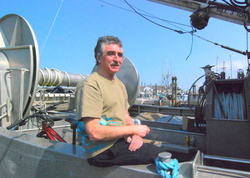 In his 35 years as a fisherman, O'Brien has seen the working fleet here at Steveston go from 600 down to 75. Even so, there are still 160 active licenses, each worth about $250,000, and it's still the largest commercial salmon fleet in North America. The harbor has a capacity of 1,000 vessels, and half the slips are occupied. (Want to tie up your boat? Day rate is $3 per meter; power will cost you another four bucks a day.)
In his 35 years as a fisherman, O'Brien has seen the working fleet here at Steveston go from 600 down to 75. Even so, there are still 160 active licenses, each worth about $250,000, and it's still the largest commercial salmon fleet in North America. The harbor has a capacity of 1,000 vessels, and half the slips are occupied. (Want to tie up your boat? Day rate is $3 per meter; power will cost you another four bucks a day.)
Used to be, the salmon boats would sell to the canneries that lined the waterfront, as many as 40 of them, giving Steveston the nickname "Salmonopolis." Today the only one left in town is the Gulf of Georgia Cannery, and it's a national museum.
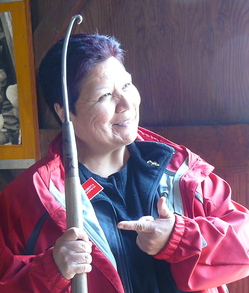 On our tour, Roberta Price posed with an instrument called a pieugh (pronouced pee-eew, as in stinky). The French-Canadians refer to it as a gaffe, and it's perhaps more familiar to fishermen as a gaffer's hook. It was wielded at the unloading dock of the cannery to snag stray fish. Getting the salmon ready for canning was a fearsome process, infernally loud, surrounded by revoltingly slimey and smelly fish guts, with hellish dangers from whirring blades, freezing cold, and brutal, numbing tedium. Before the invention of a gruesome machine (like Bennie's car in "Total Recall"), gangs of Chinese men wielded the knives that beheaded the incoming salmon; platoons of Japanese women did the cleaning, children pushed empty cans into position, Native Americans did the remaining filthy jobs. We have no idea, no idea at all.
On our tour, Roberta Price posed with an instrument called a pieugh (pronouced pee-eew, as in stinky). The French-Canadians refer to it as a gaffe, and it's perhaps more familiar to fishermen as a gaffer's hook. It was wielded at the unloading dock of the cannery to snag stray fish. Getting the salmon ready for canning was a fearsome process, infernally loud, surrounded by revoltingly slimey and smelly fish guts, with hellish dangers from whirring blades, freezing cold, and brutal, numbing tedium. Before the invention of a gruesome machine (like Bennie's car in "Total Recall"), gangs of Chinese men wielded the knives that beheaded the incoming salmon; platoons of Japanese women did the cleaning, children pushed empty cans into position, Native Americans did the remaining filthy jobs. We have no idea, no idea at all.
These days, especially during good weather, fishing boats nuzzle up to the dock below the boardwalk to sell their catch: salmon, spot prawns, sea urchins. Chefs from the restaurants come down to buy; it's not going to get any fresher.
Brian O'Brien figures he'll keep going a few more seasons. His daugher fished with him for ten years, but now she has a family of her own. "I like fishing the estuaries," he says, but it seems to him as if the government is on a campaign to regulate smaller boats like his out of business. "Up in Alaska, they support boats under five tons. Not in Canada."
Cornichon's trip to Steveston was part of a weekend called Richmond's Ultimate Food Experience, sponsored by Tourism Richmond.
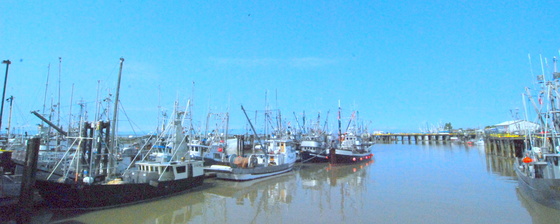
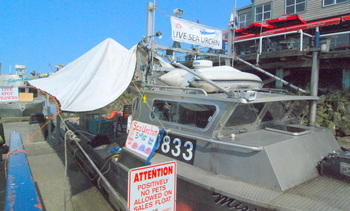
Leave a comment